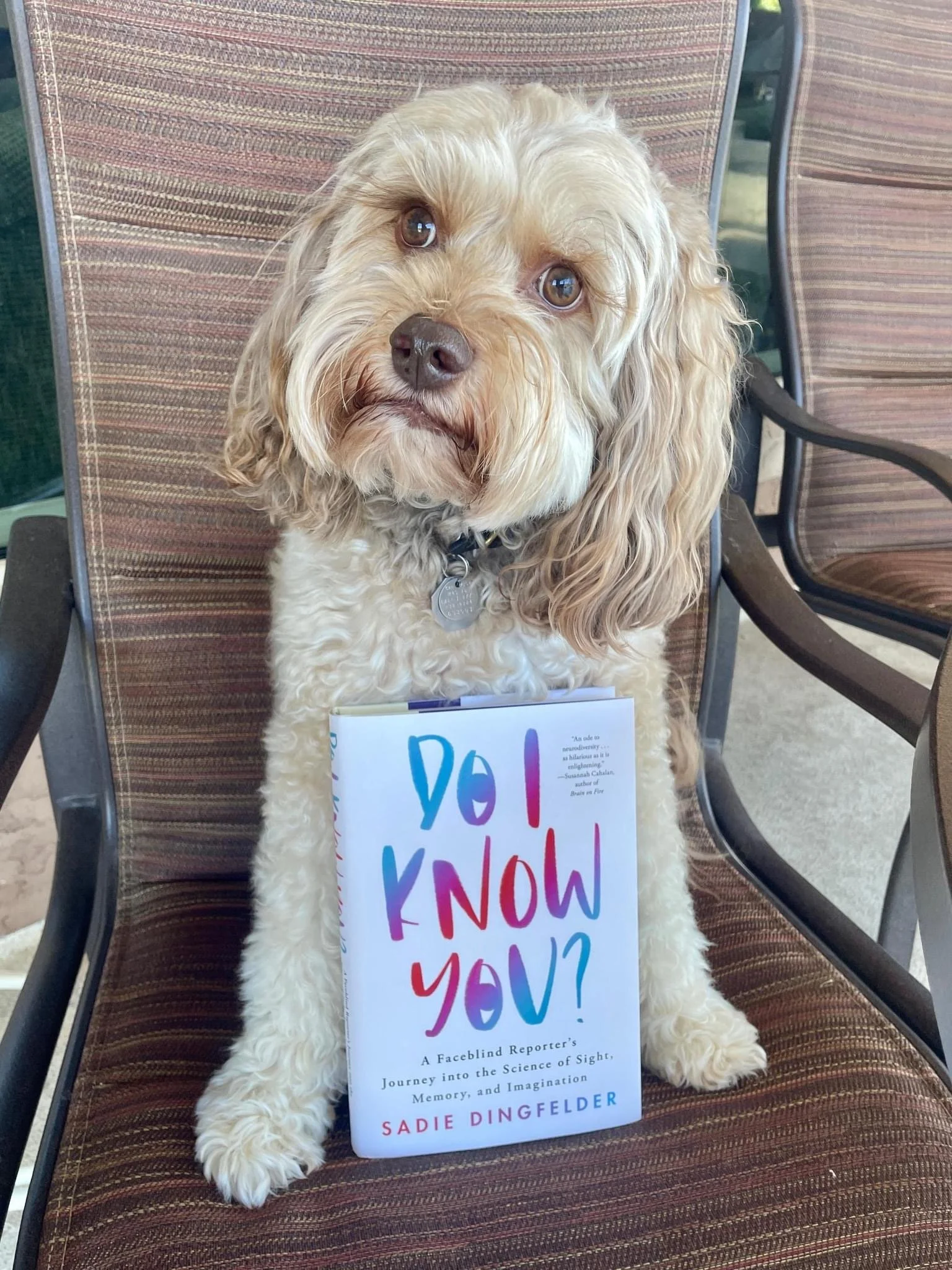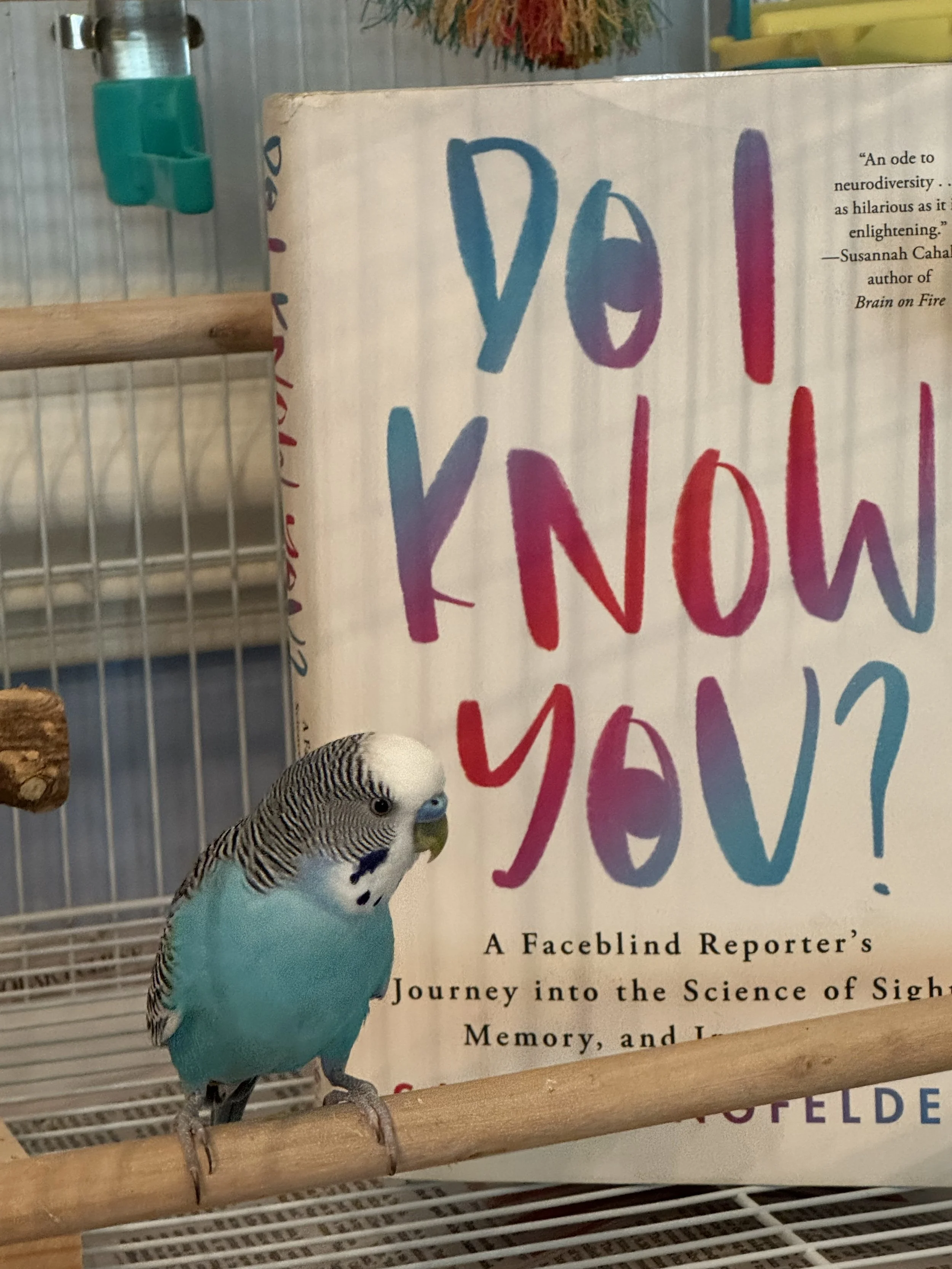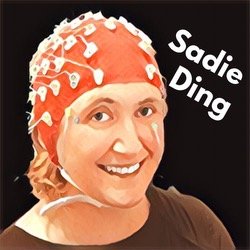
Reader’s Guide
Hello book clubs!
Below you will find some discussion questions about my book. Feel free to add your thoughts in the comments.
Want me to make a virtual appearance at your meeting? (Or maybe even an in-person one?) Drop me a line! Sadie@SadieD.com
Send me pics of yourself or your pet reading my book. :)

To disclose or not to disclose?
In the introduction of the book, Sadie decides to come clean about her faceblindness, instead of covering for it. What are some of the pros and cons of disclosing your neurodiversity? Are there situations where it’s best to fake being neurotypical? What would you do?

Is faceblindness really that big of a deal?
Sadie thought that she was basically neurotypical for most of her life. Some might argue that prosopagnosia isn’t really a big deal if you fail to notice it for nearly 40 years. What do you think?

The Parable of the Fish
Consider the parable of the fish:
An old fish passes by a school of youngsters and says,
“Hey, boys, how’s the water?”
“What’s water?” the little fish reply.
How does this explain how a person might not realize that they, for instance, lack a sense of smell?

What’s your water like?
Do you suspect that your perceptions or inner life might be unusual in some way? What tipped you off?

Wisdom and Age
Sadie writes, “A key part of being an effective con artist is conning yourself.” Do you agree? What are some truths about yourself that you were not able to see when you were younger?

Lethenomia vs. Prosopagnosia
How is forgetting faces different from forgetting names? Why do people so often conflate the two?

Everyone sucks at names.
The human brain did not evolve to remember many hundreds of people, and their names. What are other examples of modernity making demands that cause most of us to feel like we are falling short?

Where do your friends live in your head?
There’s some evidence that faces serve as the file folders for all the information you know about a person. Sadie suspects her shaky mental representation of peoples’ faces is why she often forgets facts about her friends, and sometimes their very existence. How important are shared memories to your friendships? Do you have any tricks for remembering what is going on in your friends’ lives?

Is ignorance bliss?
Sadie’s father is resistant to the possibility that his daughter is neurodivergent. Why do you think this is? What are the benefits of being blind to your own limitations? Are changing norms making neurodivergence more acceptable?

Pros and Cons of Unusual Brains
Sadie argues that all her diagnoses bring strengths as well as weaknesses. Do you believe this is true of neurodivergence in general? When does neurodivergence become a disability? When might it be an advantage?

Past or Present?
The concept of eugenics rears its ugly head at several points in Sadie’s journey -- starting with Joachim Bodamer probable participation in the Nazi regime's forced sterilization and then outright murder of neurodivergent people. In what ways might the lingering impact of eugenics still influence modern medical and societal attitudes toward neurodiversity?

Birds of a Feather
Sadie interviews several people who share at least one of her diagnoses: Steve Wozniac, Senator John Hickenlooper, Paul Foot and Craig Venter. How are their experiences similar to hers, and how are they different? Have you ever met someone who is eerily similar to you despite obvious, surface-level differences? Did you want to be that person’s friend?

Internet Superusers
The early superusers of the internet were people with rare diseases and disorders. Is that still true on today’s internet? Why or why not?

Who is right about putting stuff away, Sadie or Steve?
Sadie is stressed out by clutter due to her visual impairments. Her husband Steve can’t remember to put things away because of his ADHD. Who is more deserving of accommodation?

Your Neurodivergent Roommate
What drives you crazy about your spouse, romantic partner or roommates? Were you able to come to an acceptable compromise?

Strabismus Surgery
Two childhood surgeries forced Sadie’s eyes into cosmetic alignment -- an outcome that made her look normal to other people, without addressing her underlying vision problems. Indeed, surgery made it harder for Sadie to later learn to see normally. Given how much adversity and discrimination people with misaligned eyes face, would you make the same decision for yourself or your child?

Ralph Wiggum and Cookie Monster
Why does Sadie object to cartoonists and animators using misaligned eyes as shorthand for derangement or stupidity? What other aspects of characters’ physical appearance do artists use to indicate their internal characteristics?

Seeing and Thinking
Dr. Susan Barry reports that learning to see in 3D actually changed how she thinks. As her world inflated, she noticed that her reasoning became less linier, and she became more able to imagine multiple things happening simultaneously. Can you recall a time when a shift in perspective or a new skill changed how you reason? How might changes in other senses, like hearing or touch, alter more abstract aspects of our thinking?

The U-Shaped Happiness Curve
Have you personally experienced the U-shaped happiness curve, where people are happiest when they are young and old, and least happy at midlife? This tendency crosses socioeconomic, cultural and even species boundaries. What do you think is driving it?
